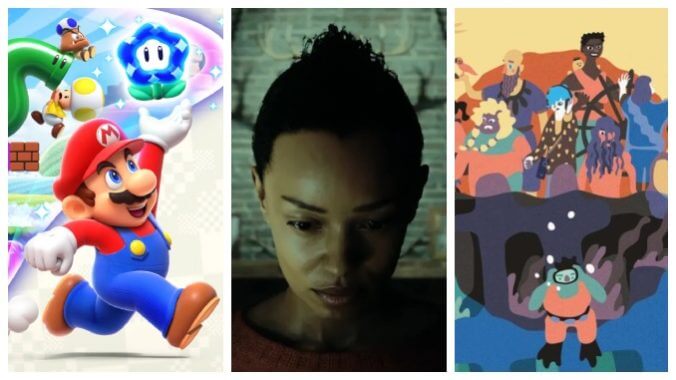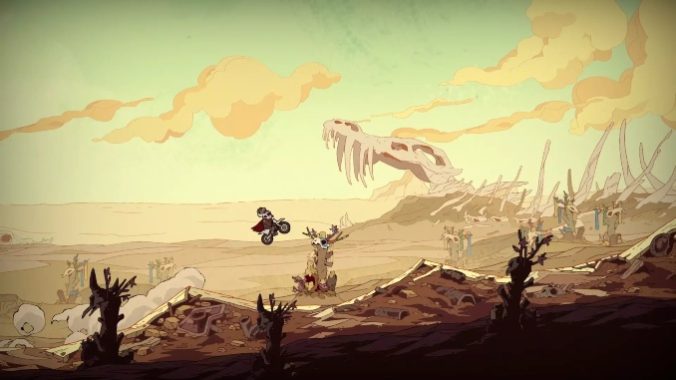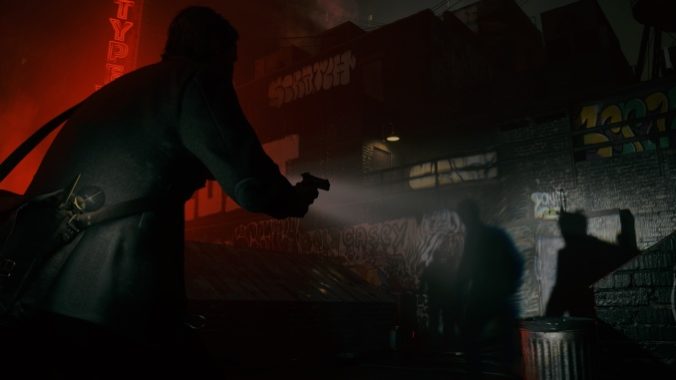
Last month in this space I wrote about how September is when the games business gets really busy, cranking out games every week to capitalize on the holiday shopping season. It ramps up even more in October, with more hot new gaming action than anyone with a life could ever hope to contend with. This October we were treated to a new (and newly elephantine) Mario, the latest metafictional mindfuck from Sam Lake and Remedy Entertainment, and a number of less hyped games that are just as worthy of praise and recognition. Oh, there was also not one Spider-Man, but two —with a Venom tossed in for good measure. It was a good month for games, and here are our picks for the cream of the crop–the best new games of October, 2023.— Garrett Martin
5. Laika: Aged Through Blood

Over the last decade, there’s been no shortage of videogames about sad dads, but we’ve been deprived of similar stories following gruff, melancholic moms. Laika: Aged Through Blood , the latest from the Madrid-based developer Brainwash Gang, fills this gap. Laika is a canine gunslinger tasked with protecting her daughter and village from the encroaching imperialistic might of the Birds, a quickly expanding military force that seeks to dominate all non-beaked life. Amidst a Western-tinged wasteland that is bracing for the end, our hero is forced to rely on her six shooters to shield those she cares about from impending doom. Although it has some rough edges, between its slow-mo motocross shootouts, grim but not overbearingly nihilistic backdrop, and thoughtful exploration of imposed sacrificial motherhood, it blends its inspirations to create something tonally unique. Despite its extreme violence and unapologetic bleakness, Laika is defined by a surprising emotional range thanks to its compelling protagonist and her brutal quest to save those she loves.— Elijah Gonzalez
4. Marvel’s Spider-Man 2

Marvel’s Spider-Man 2 feels like the best of the three games Insomniac has managed to put out in this series, and this especially helped me explore the game’s nook and crannies to the extent I managed. Web-swinging feels as seamless and kinetic as ever and, to sell a completely different fantasy, Insomniac has given players wings to sort of fly with. It’s more like a glide, but frequent wind tunnels and rooftop vents make it so that you can essentially fly through the city and even into other boroughs with relative ease. In spots like Astoria, which are mostly residential suburbs and thus close to the ground, it feels nice to have the alternative option, which pairs well with a super jump either Spider-Man can now use. Miles has a slight edge in that his Venom lightning powers include a jump and dash forward that especially give him momentum. These powers also help Miles stand out in combat, emerging as the lither of the two protagonists, whereas Peter and his Spider-Arm tech and Symbiote powers clearly hold more of the brute force. While they stand apart, people will gravitate towards their favorite and will largely find they play them very similarly, especially since they share half their abilities and all their gadgets. It’s a largely commendable sequel, building on what’s come before it in smarter ways than I’d expect from most AAA titles.— Moises Taveras
3. Super Mario Bros. Wonder

One of Super Mario Bros. Wonder ’s major new additions to the Mario canon is the Wonder Flower. It’s a big blue bouncing flower that triggers a psychedelic hurry-up state called a Wonder Effect that warps the level and its characters in weird and unpredictable ways. Wonder Flowers can incite some of the most hallucinatory and memorable sequences in recent Super Mario history, which help make Wonder one of the most unique games in the series’ long history. A perfect example: in one early level, the Wonder Flower turns a legion of Piranha Plants—those Venus Mario-traps that pop out of vines in the Mushroom Kingdom—into a veritable chorus line right out of musical theater, with an elaborate song- and-dance routine that’s one of the most unexpected and charming things I’ve seen in a game in years. Moments and details like these have made Wonder an unpredictably refreshing new spin on the most basic Mario-isms, and the first side-scrolling Mario game that could be considered genuinely revelatory in about 30 years.— Garrett Martin
2. Saltsea Chronicles

In its portrayal of a society based on mutual entanglement, Saltsea Chronicles resists the temptation to sever its beautifully drawn post-disaster world from reality and make it pure fantasy. Instead, mentions of the world before — our world, it turns out — drip through. Throughout it echoes the philosophies of anarchist and socialist thinkers, as well as existing and pre-existing collectivist societies. In linking the Saltsea archipelago to our world while also making it meaningfully distinct, the game resists becoming an allegory and becomes a story in and of itself. It extends beyond being a mirror for contemporary society and instead becomes an illustration of an alternate path forward, another way we could approach the same issues of climate change and environmental devastation that make up the characters’ pasts and presents. In the same vein, Saltsea Chronicles is interested in the injustices that arise when you attempt to construct a wholly non-hierarchical society. It chooses not to structure post-Flood Saltsea as a perfect utopia, instead noting repeatedly and often the ways it fails. In my time with the game this was what impressed me the most: its commitment to realistically presenting the challenges that would be present in a society that’s nominally about fairness and mutual input. People get greedy and claim power anyway, people leverage non-hierarchy to be in control. And less maliciously, people are forced into a controlling role despite their wishes, because of other people’s expectations and desires. —Emily Price
1. Alan Wake II

Sam Lake reaches the apotheosis of his postmodern kick with this sequel to one of 2010’s most interesting videogames. The Remedy Entertainment head has long tried to break down the barriers between games, film, and literature in a knottier, more avant-garde fashion than the many major studios making “cinematic” games, influenced as much by Pynchon and Twin Peaks as noir or horror movies, and with Alan Wake II he’s crafted another impressive combo of commercial blockbuster and trippy experimentalism. A survival horror game that explores notions of free will, destiny, authorship, and ownership, Alan Wake II doesn’t come close to answering all of the questions it asks, but it raises them with such style, confidence, and confusion that you’ll realize the answers don’t matter. It’s far from a perfect game —the investigation mechanics are inelegant, and Lake’s big narrative swings don’t always connect—but Alan Wake II does more than any other game to undermine the bullshit dichotomy between “AAA” and “indie” games. Just because a game has a budget and a large team doesn’t mean it has to be a safe, hackneyed, overly familiar genre workout.— Garrett Martin